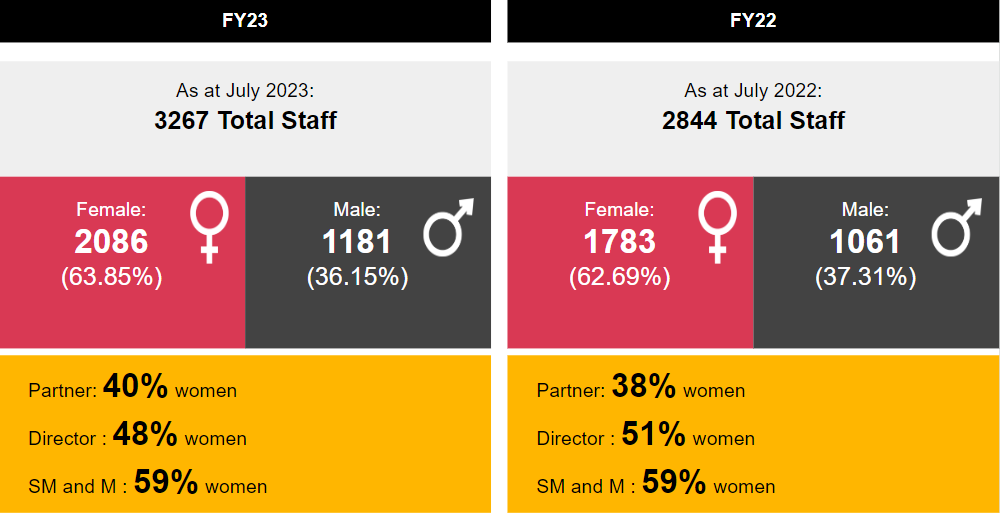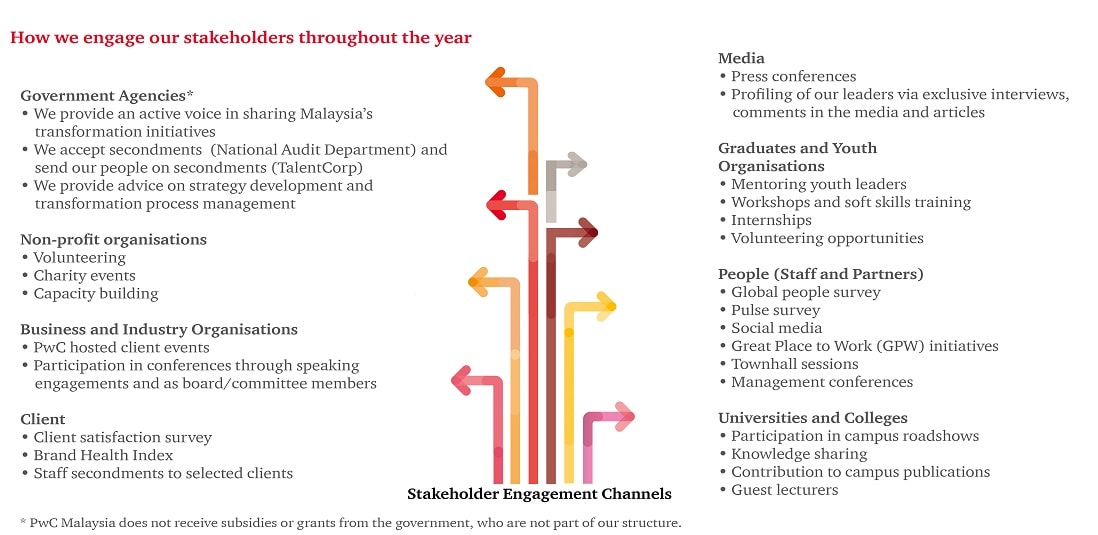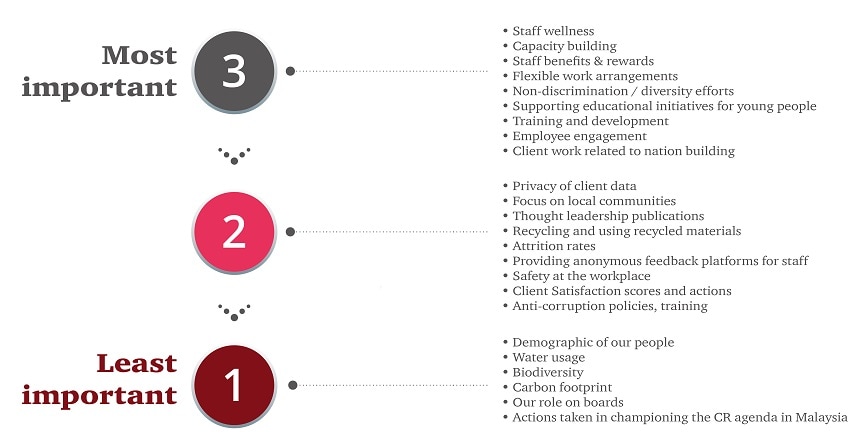
About the firm
Find out about PwC Malaysia through these links:
Note: We are unable to report revenue numbers as this information is not publicly shared in Malaysia.
About our people
Our numbers have grown steadily over the past three years, as we broaden and diversify our services in line with client needs and global megatrends.

Helping to solve important problems
Many of our Partners and Directors serve as board/committee members in various professional bodies and industry organisations. In Malaysia, these include:
- 30% Club
- Financial Reporting Foundation
- Malaysian Accounting Standards Board (MASB)
- Malaysian Institute of Accountants (MIA)
- Malaysian Institute of Certified Public Accountants (MICPA)
- Islamic Finance for Labuan Offshore Financial Services Authority
- Association of Chartered Certified Accountants, Malaysia (ACCA)
- CPA Australia
- Institute of Chartered Accountants in England and Wales (ICAEW)
- American Malaysian Chamber of Commerce (AMCHAM)
- Association of Chartered Islamic Finance Professionals in Malaysia
- International Accounting Standards Board (IASB) Committee on Islamic Finance
- British Malaysian Chamber of Commerce Berhad (BMCC)
- Talent Corporation Malaysia Berhad (TalentCorp)
- Malaysian International Chamber of Commerce and Industry (MICCI)
Key appointments
- Our Managing Partner Soo Hoo Khoon Yean is the Vice President of the Malaysian Institute of Certified Public Accountants (MICPA). He is also a Board Member of the British Malaysian Chamber of Commerce (BMCC).
- Our Assurance Leader Ong Ching Chuan is a Malaysian Institute of Accountants (MIA) council member.
- Pauline Ho is a member of the Steering Committee of 30% Club, Malaysian Chapter, launched in May 2015 to increase the number of women in decision making positions. She is also a member of the Integrated Reporting Steering Committee and Practice Review Committee of the Malaysian Institute of Accountants.
- Nik Shahrizal is a Committee member, of ICAEW Members’ in Malaysia Society.
- Manohar Johnson is the Deputy Chair of the Malaysian ACCA Council (MAC).
- Yap Sau Shiung, Malaysia Division: Divisional Councillor, CPA Australia.
- Benedict Francis is a member of the General Committee at the Malaysian International Chamber of Commerce and Industry (MICCI) National and is the Vice Chairman of MICCI Southern.
- Huck Khiam Lim is an Exco member at MICCI Northern.
Report structure
Our report covers PwC’s Purpose, our priorities and how we will reach it.
We have been reporting our Corporate Responsibility activities since 2009 and began reporting against the Global Reporting Initiative (GRI) framework since 2012, in accordance with the GRI Standards: 'Core option'. Starting from 2017, we have used Integrated Reporting <IR> principles to guide our content.
We have the support of our Sustainability & Climate Change Consulting team in verifying the report in line with GRI guidelines; as well as our Integrated Reporting team’s advice on <IR>.
This full report and the summary which highlights achievements covering the operations of PwC Malaysia during the firm’s 2022 and 2023 financial year, from 1 July 2021 to 30 June 2023.
There is no re-statement of information from earlier reports, issued from 2009 to 2022.

Stakeholder engagement
Our stakeholders are people or organisations who we have worked closely with or who have an interest in our business. We actively engage them to obtain feedback on issues that are of shared interest, from accounting development to corporate governance and talent attraction. We do this through the following channels:
Our people through the annual Global People Survey, townhalls and focus groups
- Our people who volunteer for our Corporate Responsibility (CR) programmes via email and face-to-face interactions throughout the volunteering programme
- Our clients through client satisfaction surveys
- Regulators and professional associations through our participation as board or committee members
- Our potential recruits through social media, via their campus advisors and initiatives such as the Trust Builders Challenge
- Charity partners who benefit from our CR programmes through personal feedback and survey forms at the end of each volunteering programme
Not only does feedback from our stakeholders help determine topics of interest for the report; more importantly, it helps us improve our services and programmes to further add value to our stakeholders.
We often have feedback sessions with our people on various topics, from work to wellbeing. We found the qualitative feedback valuable and insightful and will consider engaging our people more consistently. The issues and feedback raised were analysed and validated at our highest governing entity, the Country Management Board team and were used to guide our CR strategy.
Engaging other stakeholders
- Media: We engage the media regularly, providing thought leadership publications that are relevant to the public and points of view on key business topics e.g. economics, audit and tax matters and governance.
- Clients: Through our client feedback programme, our clients tell us that we do well in translating insights and technical knowledge into practical advice in helping them work more efficiently. A key area that they think we can do more of is to give an added dimension to the work we do - for example, in the form of sharing best practices, industry insights, out-of-the-box ideas and solutions.

Materiality assessment
We focus our Corporate Sustainability (CS) activities and reporting on the issues of importance to PwC and our stakeholders.
Feedback from regular engagement with our biggest stakeholders, our people, helps us identify the issues that are most significant – or ‘material’ – to PwC.
We use a ‘materiality matrix’ to map the issues that our stakeholders are most concerned about against those that have the biggest impact on our business.
You will read about topics that are significant to our stakeholders and to the business in this report.
We are cognisant that as we continue to engage our other stakeholders, the materiality matrix and reporting content may change.
Results of the survey helped us set directions, plan forward and make plans that would be meaningful and sustainable for our beneficiaries and our people. The strategy was validated with the Country Management Team and then shared with our people.
We’ll continue our focus on Education and Capacity Building (helping people build skills to meet their goals) and aim to be more strategic and focused in our efforts.
We are in the process of updating our Materiality Assessment, of which will be presented in our next Annual Report.
| GRI Standard | Global Standard Disclosures Descriptions | Links |
| 2 | The organisation and its reporting practices 2-1 Organisational details 2-2 Entities included in the organisation’s sustainability reporting 2-3 Reporting period, frequency and contact point |
About this report |
| 2 | Activities and workers 2-6 Activities, value chain and other business relationships 2-7 Employees |
About this report |
| 2 | Governance 2-9 Governance structure and composition |
About this report, Leadership team |
| 2 | Strategy, policies and practices 2-22 Statement on sustainable development strategy 2-23 Policy commitments 2-26 Mechanisms for seeking advice and raising concerns 2-27 Compliance with laws and regulations 2-28 Membership associations |
Foreword, Main page, About this report |
| 2 | Stakeholder engagement 2-29 Approach to stakeholder engagement |
About this report |
| 3 | Material Topics 3-1 Process to determine material topics 3-2 List of material topics |
About this report, Materiality assessment |
| 203 | GRI 203 – Indirect Economic Impacts 203-1 Infrastructure investments and services supported 203-2 Significant indirect economic impacts |
Opportunities |
| 305 | GRI 305 – Emissions 305-1 Direct (Scope 1) GHG emissions 305-2 Energy indirect (Scope 2) GHG emissions 305-3 Other indirect (Scope 3) GHG emissions 305-5 Reduction of GHG emissions |
Net Zero journey and targets |
| 404 | GRI 404: Training and Education 404-1 Average hours of training per year per employee 404-2 Programs for upgrading employee skills and transition assistance program 404-3 Percentage of employees receiving regular performance and career development reviews |
Growth |
| 405 | GRI 405: Diversity and Equal Opportunity 405-1 Diversity of governance bodies and employees |
About this report |
| 413 | GRI 413: Local Communities 413-1 Operations with local community engagement, impact assessments, and development programs 413-2 Operations with significant actual and potential negative impacts on local communities |
Opportunities |
Contact us


















